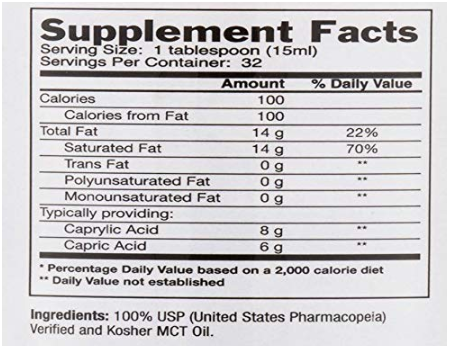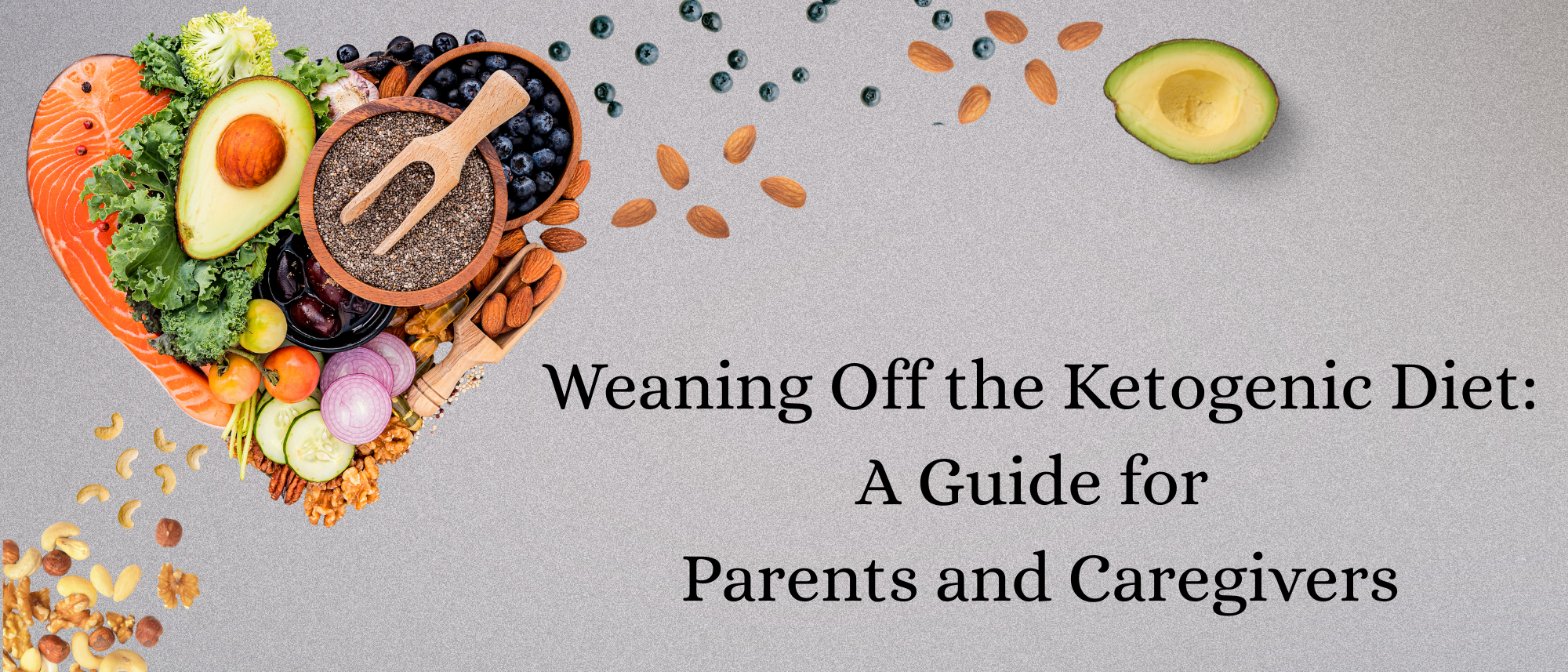The Adventures of MCT Oil
/Updated: 2/1/22
By Laura Dority MS RD LD
What is all this fuss about MCT oil? What is it? When should it be used? Can it be harmful? You may have heard a lot about MCT oil and its role in ketogenic diet therapy but you may also have a lot of questions about this product. As a ketogenic dietitian I use MCT oil all the time. In fact, I would estimate that at least 50% of my patients consume MCT oil on a daily basis - it is definitely one of my favorite hacks I recommend to patients. So let’s dig in and I’ll give you my opinion on when I use it, what the side effects are, how to identify a quality brand and more.
MCT stands for medium chain triglycerides. Triglycerides are just a fancy word for fat. Fats are made up of chains of carbon atoms and are divided into 3 categories:
Short chain fatty acids: Fewer than 6 carbon atoms. This type of fat does not occur naturally.
Medium chain fatty acids: Contain 6-12 carbon atoms. Occurs naturally in coconut oil, palm kernel oil and in a small amount butter.
Long chain fatty acids: More than 12 carbon atoms.
Why is this important? Long chain fatty acids are more complex for our bodies to breakdown due to the longer chain of carbons and therefore more bonds to break. MCTs are easily absorbed and bypass much of the digestion process. Because of this easier digestion, MCTs provide a quick energy source for ketone body production. There is even some evidence to suggest there is an additional anti-epileptic effect (outside of ketone enhancement), particularly with caprylic acid (C8). For the rest of this article we are going to be primarily discussing the following MCT’s: caprylic acid (C8), capric acid (C10) and lauric acid (C12).
Coconut Oil vs MCT Oil Supplement
Often times coconut oil and MCT oil are promoted as the same which is not technically true. MCT oils generally contain either 100% caprylic acid (C8), 100% capric acid (C10) or a combination of the two. Lauric acid (C12) on the other hand is the main component in coconut oil. MCT oil supplements rarely contain any of the lauric acid. Why does this matter? That question is actually a widely debated and controversial topic. I treat MCT oil supplements and coconut oil differently. Coconut oil can be a great way to get some MCT into your keto diet but I won’t say it’s fully comparable to an actual MCT supplement. It certainly is possible that the different MCTs work differently in our bodies. A great thing about coconut oil is it’s very stable at high cooking temperatures. This is NOT the case with MCT oil supplements.
So to pull this complex topic together- use both! Use coconut oil to cook and bake and use MCT oil has an added supplement to your daily plan to get a variety of MCTs.
When to Use:
Keep in mind that MCT oil is rather versatile and there are many reasons and ways to use this product. Often it helps with diet palatability, decreasing the amount of fat needed from other foods. Likely the most common reason to use MCT oil is for constipation management. Since it’s easily digestible it generally empties through our digestive system quicker than other oils which can combat the constipation side effect we commonly see on a keto diet.
Another reason to use MCT oil is to provide a more energy-efficient ketone producing fuel source. A tablespoon of MCT oil compared to a tablespoon of olive oil (long chain fatty acid) would produce deeper ketosis.
Patients with carnitine deficiency may also benefit from MCT oil supplementation. MCTs do not require carnitine for digestion. Over the past few years I have had a lot of patients that do not tolerate carnitine supplements. By adding a little lamb to naturally boost carnitine levels and using more MCT oil instead of long chain fats you can increase the supply of carnitine and decrease the demand at the same time.
There is also some evidence to support anti-inflammatory, anti-microbial and anti-viral properties of MCT oil but those are hard to measure in a clinic setting so I really focus on constipation, ketone production and carnitine deficiency.
How Do I Incorporate?
First and foremost, reach out to your ketogenic diet team to determine a starting dose and schedule. It may need to be incorporated into your mealtime ratio.
Add to beverages
Add to food such as low carb yogurt or a smoothie
Drizzle over salads
Incorporate into fat bombs
Take it like a shot
Mix into a mayo sauce (tuna salad, dip)
Just remember, MCT oil should not be heated. It’s okay to add to hot beverages but you should not cook with it. Also, for best results, spread the MCT oil throughout the day.
Side Effects:
The number one side effect with MCT oil is GI discomfort and/or diarrhea. If you do experience some GI discomfort or loose stools, it does not mean you cannot tolerate ANY amount of MCT oil. It probably means you took too much-try a smaller amount and spread throughout the day. I would also advise to start small and increase slowly so your body can adjust to the digestion. This can help minimize side effects.
Quality Brands:
It’s important to make sure you are purchasing a MCT oil supplement from a reputable company. No one wants to pay top dollar for MCT oil that ends up being a glorified vegetable oil. Remember that supplements are not regulated so you have to buy from a trusted source such as a medical food company or a company that voluntarily has their product tested by a third party. One easy way to find a reputable source is to look for the USP Verified Mark. Seeing the USP Verified Mark on a dietary supplement label indicates the product contains the ingredients listed on the label and the amount stated.
After finding the USP Verified Mark on a product, you also want to make sure the product contains both a combination of caprylic acid (C8) and capric acid (C10). It is not necessarily a requirement that the company tell you if they use both C8 and C10 so you may have to do a little digging. Here is an example label of a good product that has both the USP Verified Mark and provides a nice breakdown of both C8 and C10. Some good OTC brands often used are Now, Nutiva and Nature’s Way Organic.
Another option would be to purchase a MCT oil manufactured by a medical food company such as Liquigen® (manufactured by Nutricia) or BetaQuik® (manufactured by Vitaflo). Not only are these products manufactured by trusted companies, but the products are also emulsified. Emulsified products stay in solution – so you can avoid that separation you commonly see if you mix oil into other foods.
Insurance Coverage:
Most insurance companies consider MCT oil a supplement and since it’s readily available over the counter, it’s rare you can get insurance coverage. Clearly this varies widely from state-to-state but I personally have gotten coverage for kids who are fed via g-tube. I also generally have better success getting the emulsified products (Liquigen® and BetaQuik®) covered. Nutricia and Vitaflo who make these products have letters of medical necessity and patient assistance programs on their website that can be very helpful. Some Medicaid plans have oral supplement coverage that would be worth a try. Bottom line –call your insurance company - it never hurts to ask!
As a recap – MCT oil can be a great addition to keto plans but should be individualized for the patient depending on what the goals are and how much of the product can be tolerated. Remember these are strictly just my opinions and experience with using MCT oil in my own clinical practice. Different ketogenic diet programs may use MCT oil with a different approach.
Updates:
Recent animal studies suggest that MCT oil as 9% of total caloric intake improved spatial working memory and problem solving skills. (Epilepsy & behavior, 2021-01, Vol 114 (Pt.A) p107608)
A pilot study in healthy older adults showed improvements in working memory, inhibitory processing, problem solving and motor control that approached significance. (Alzheimer’s & dementia, 2021-12, Vol.17 (S6)
A systematic review revealed that MCT does not increase cholesterol, LDL or HDL, but does cause a small increase TG. (The Journal of nutrition, 2021-10-01, Vol 151 (10), p.2949-2956.)
Disclaimer: The advice mentioned in this article is my opinion only. You should always check with your medical providers if consuming MCT oil as a part of your ketogenic diet is appropriate for you. In addition to the brands mentioned in this article are strictly my opinion only and I have NOT received any funding to promote these brands.
























